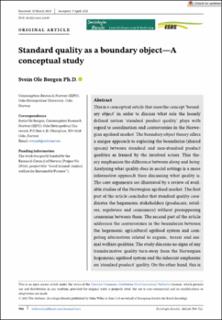Standard quality as a boundary object - A conceptual study
Peer reviewed, Journal article
Published version
Date
2021-04-15Metadata
Show full item recordCollections
Abstract
This is a conceptual article that uses the concept ‘boundary object’ in order to discuss what role the loosely defined notion ‘standard product quality’ plays with regard to coordination and controversies in the Norwegian agrifood market. The boundary object theory offers a unique approach to exploring the boundaries (shared spaces) between standard and non-standard product qualities as framed by the involved actors. This theory emphasises the difference between doing and being: Analysing what quality does in social settings is a more informative approach than discussing what quality is. The core arguments are illustrated by a review of available studies of the Norwegian agrifood market. The first part of the article concludes that standard quality coordinates the hegemonic stakeholders (producers, retailers, regulators and consumers) without presupposing consensus between them. The second part of the article addresses the controversies in the boundaries between the hegemonic agricultural agrifood system and competing alternatives related to organic, terroir and animal welfare qualities. The study discerns no signs of any transformative quality turn-away from the Norwegian hegemonic agrifood system and the inherent emphasise on ‘standard product’ quality. On the other hand, this is not static since different interpretations of quality continuously challenge each other.

